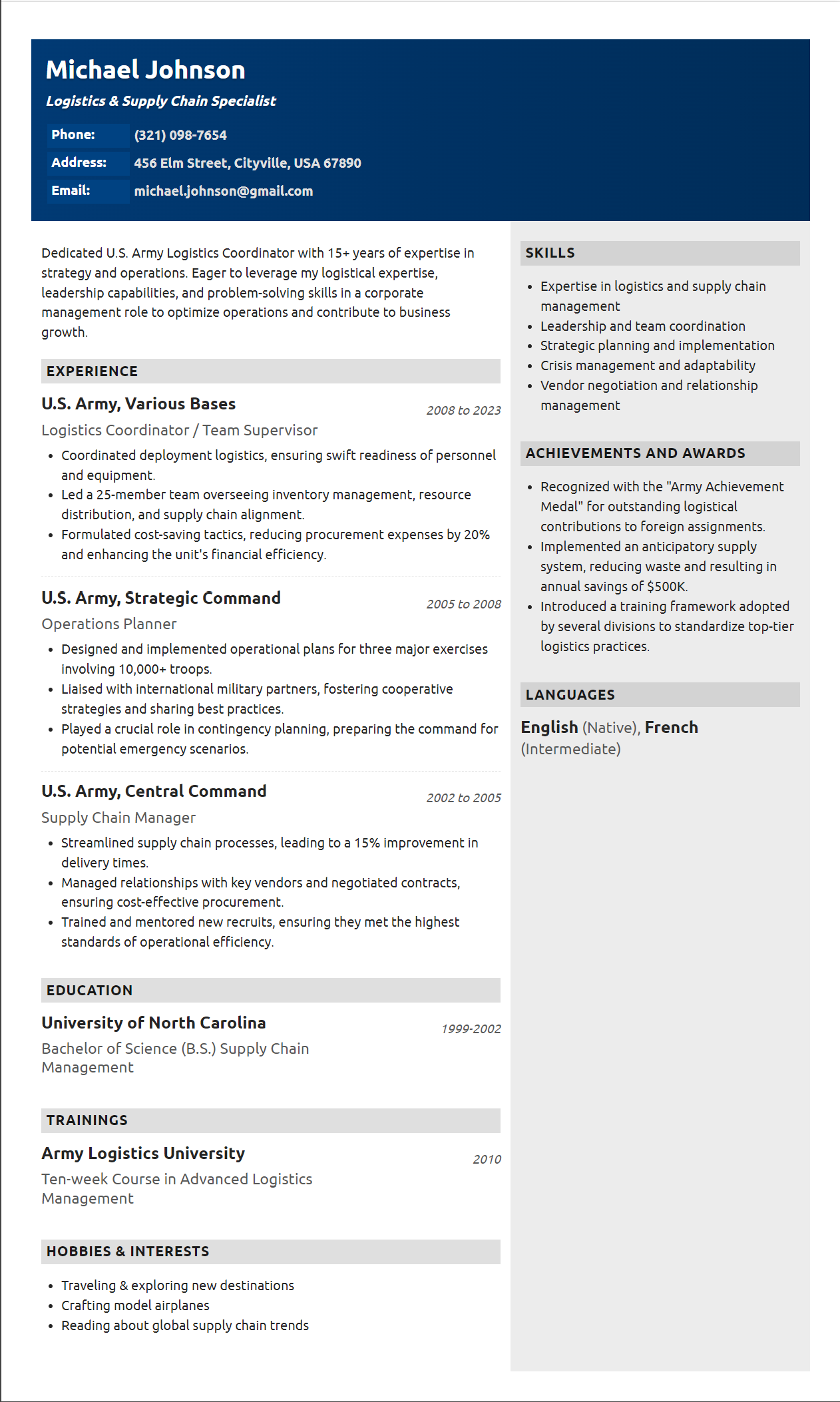
Coming from the military, you’ve learned a lot of valuable skills during your service that can help you do well in many jobs. As you transition to civilian life, it’s crucial to frame your military skills in a way that resonates with future employers, showcasing how your service can significantly benefit their organization.
This transformation requires carefully crafting your resume, the primary tool to showcase your career journey. Turning military experiences into a civilian-friendly resume can be intricate, requiring a shift in language and presentation.
Our goal with this guide is to simplify the process of transforming your military background into a compelling narrative that fits the needs and expectations of civilian employers.
Check out the sample resume at the end of this guide.
Why do employers value military service experience?
Whether you’ve served in the military for just four years or as long as twenty-four, the skills and experiences you’ve picked up are precisely what many employers seek. Your military training has given you many highly prized abilities in regular jobs, including:
- Top-notch leadership skills
- An excellent work ethic that sets you apart
- Strong discipline
- Respect for rules and hierarchy
- Outstanding teamwork abilities
These skills can make a real difference in any workplace, so employers value your military background.
Importance of translating your military skills on your resume
Translating your military skills into your resume is vital to ensure potential employers can understand the significance of your military service and its relevance to the job role. The challenge lies in presenting this information in a language that is both civilian-friendly and relevant to your desired position. The following strategies can assist you in achieving this:
Highlighting transferable skills
During your military service, you have gained valuable transferable skills like leadership, discipline, and strategic planning, which are in demand across various civilian roles and industries. These should be prominent in your resume, with specific examples demonstrating how you’ve applied these skills.
Structuring your military experience
How you present your military service experience on your resume can significantly impact how potential employers perceive your qualifications.
Format
You have two main options:
- Chronological Format: This conventional resume structure presents your experiences in reverse chronological order and is ideal if the job you’re targeting aligns with your military service.
- Functional Format: This format is skills-focused, grouping your experiences by skill categories rather than in chronological order. If your military experience doesn’t directly correlate to the job you’re applying for, a functional resume could allow you to highlight the transferable skills that qualify you for the role.
Check out our in-depth article on the different resume formats.
Timelines
The frequent role or location changes typical in the military service might overwhelm civilian employers. Therefore, it’s beneficial to group similar experiences into broader periods. For instance, roles like Avionics Craftsman, Journeyman, and Apprentice can be unified as “Technician / Crew Lead, United States Air Force, 2015 to 2021,” providing a clearer view of your military service.
Translating military jargon
General
As you document your military experience, it’s vital to remember that the civilian hiring manager reading your resume may not be familiar with military terminology. Therefore, it’s crucial to translate military jargon into civilian terms. For instance, instead of “reconnaissance,” you could say “information gathering.”
Job titles
Job titles are crucial in conveying your experience during the initial scan of your resume. Therefore, replace military-specific terminologies and acronyms with universally accepted civilian roles. For example, you could use “Manager” instead of “Non-commissioned Officer in Charge” or “Chief Petty Officer,” and terms like “Team Leader” or “Crew Manager” could substitute military codes such as 11B for Infantryman.
Customized resume highlights
Avoid overwhelming potential employers by only including details relevant to the job you are applying for. Here are some key aspects to consider:
Outline job descriptions
Under each job, briefly describe your role, responsibilities, and achievements. Use bullet points to make this information easy to read. Emphasize achievements demonstrating your skills, leadership, and ability to thrive in challenging situations.
Display relevant training
In your military tenure, you’ve acquired specialized training, some of which can be beneficial in civilian roles. Make sure to translate these into civilian terms. For instance, if you attended the NCO Academy, represent it as a “Six-week course in leadership and professional communication” on your resume.
If a training doesn’t directly apply to the job you’re seeking, you may leave it off to keep your resume focused and concise.
Integrate military honors and awards
Although military awards and honors testify to your commitment and excellence in service, they may not add value if not understood by civilians. Therefore, integrate these honors into your accomplishment statements instead of listing them separately.
Highlight measurable accomplishments
Include numbers and metrics to help employers understand the scope of your accomplishments. Metrics such as the number of people you supervised, the value of the equipment you managed, and any improvements you achieved can be helpful.
Additional tips
Incorporate action verbs
Beginning each job description point with a powerful action verb can make your resume more compelling and help hiring managers visualize you performing the role effectively. For instance, replace “Handled a team” with the more vibrant phrase “Led a team.”
Proofread your resume
Proofread your resume diligently to eliminate any errors, demonstrating your dedication to maintaining professionalism. Request feedback from a non-military contact to ensure your resume is clear and understandable to civilians.
Use keywords
Incorporate specific keywords featured in job descriptions into your resume to align with the employers’ requirements. Keywords can help your resume pass through Applicant Tracking System software, which searches for specific words and phrases to identify the strongest resumes.
Resume length
Make sure your resume is at most two pages long. Keeping your resume at this length ensures that readers stay interested and don’t miss any crucial details. Plus, it prevents overwhelming employers with too much information all at once.
Bullet points
Use engaging and concise bullet points, ideally spanning one to three lines, for easy reading and better retention.
Build your professional resume with Resumonk
Shaping your military service background into a civilian-friendly resume might seem tricky initially, but with Resumonk, it’s a breeze. Our wide range of professional resume templates can help you showcase your skills in the best light. Your military background can be a powerful asset, making your move to civilian work smoother.
Resumonk’s AI Resume Builder can help you craft an impressive resume with expert AI rewrites, smart AI suggestions, and seamless import from LinkedIn or any PDF/DOCX. Start your free trial today!
Take cues from our sample resume below, created using Resumonk’s Elemental template.

Here is the text version of the above sample resume:
Michael Johnson
Logistics & Supply Chain Specialist
| Phone: | (321) 098-7654 |
| Address: | 456 Elm Street, Cityville, USA 67890 |
| Email: | [email protected] |
Dedicated U.S. Army Logistics Coordinator with 15+ years of expertise in strategy and operations. Eager to leverage my logistical expertise, leadership capabilities, and problem-solving skills in a corporate management role to optimize operations and contribute to business growth.
EXPERIENCE
U.S. Army, Various Bases
Logistics Coordinator / Team Supervisor – 2008 to 2023
- Coordinated deployment logistics, ensuring swift readiness of personnel and equipment.
- Led a 25-member team overseeing inventory management, resource distribution, and supply chain alignment.
- Formulated cost-saving tactics, reducing procurement expenses by 20% and enhancing the unit’s financial efficiency.
U.S. Army, Strategic Command
Operations Planner – 2005 to 2008
- Designed and implemented operational plans for three major exercises involving 10,000+ troops.
- Liaised with international military partners, fostering cooperative strategies and sharing best practices.
- Played a crucial role in contingency planning, preparing the command for potential emergency scenarios.
U.S. Army, Central Command
Supply Chain Manager – 2002 to 2005
- Streamlined supply chain processes, leading to a 15% improvement in delivery times.
- Managed relationships with key vendors and negotiated contracts, ensuring cost-effective procurement.
- Trained and mentored recruits, ensuring they met the highest standards of operational efficiency.
EDUCATION
University of North Carolina
Bachelor of Science (B.S.) Supply Chain Management – 1999-2002
TRAINING
Army Logistics University
Ten-week Course in Advanced Logistics Management – 2010
SKILLS
- Expertise in logistics and supply chain management
- Leadership and team coordination
- Strategic planning and implementation
- Crisis management and adaptability
- Vendor negotiation and relationship management
ACHIEVEMENTS AND AWARDS
- Recognized with the “Army Achievement Medal” for outstanding logistical contributions to foreign assignments.
- Implemented an anticipatory supply system, reducing waste and resulting in annual savings of $500K.
- Introduced a training framework adopted by several divisions to standardize top-tier logistics practices.
LANGUAGES
- English (Native)
- French (Intermediate)
HOBBIES & INTERESTS
- Crafting model airplanes
- Reading about global supply chain trends



